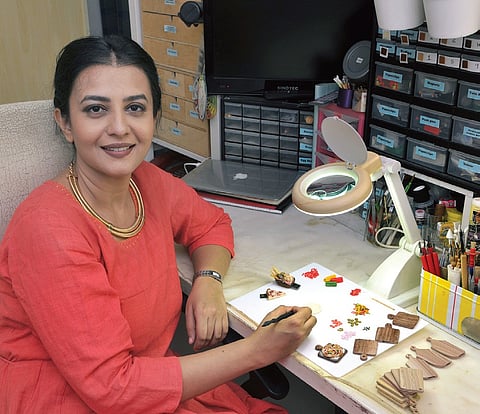

Shirali Patel was working in retail chains when she started collecting quirky miniature objects and dollhouse miniatures. Today, her one-woman firm Small Idea is selling her handmade miniatures through online stores and as personalised gifts.
“I was fascinated by miniatures at exhibitions in 2005 and 2006. I love miniatures of food, and remember some beautiful pieces in Bangkok. The delicate creations of platters with tropical fruit slices and prawns on a fridge magnet were just lovely. While working in the retail sector in Singapore, I started out on my hobby of making miniature dollhouse-type food from polymer clay around 2010-11,” says the 40-year-old.
Patel’s background in fashion and ceramics design helped her learn how to blend, shape, texture and finish polymer clay to make precise, realistic miniatures. Her first creation was a pair of miniature dollhouse-type shoes. She slowly began to focus more on food creations, starting with Southeast Asian foods available in Singapore.
After returning to Ahmedabad from Singapore a few years ago, Patel started making miniatures for her collection. She then started selling her products at weekend markets and events. “Since I did not want to restrict myself to dollhouse products, I built an accessories range that includes coasters, paper clips, magnets, push pins, earrings, bookmarks, charms, and USB drives encased in a polymer clay miniature,” she says. In 2011, she started her firm Small Idea, and since then online stores and social media have helped her reach a good audience for her miniatures.
Patel says her first creation was fafda, the popular streetside breakfast combination, which is made of dough fritters called fafda, the pretzel-shaped sweet ‘jalebi’, shredded dry papaya called ‘cheen’ on the side and dips. “I selected a room at home that could be kept dust-free and clean, with a work table and places for my clays, colours, kitchen tools, books, reference cards, pins, brushes, toothpicks and needles that are useful for texturing,’’ she says.
Gradually, she began getting corporate and individual orders for personalised gifts. “I have made on order miniatures of pet dogs, racing cars, cricket and many other popular themes, but I find it most gratifying to make food. This is also because I like food and love looking at food creations,” says Patel.
Making miniatures of food is a challenging task. Attention to details makes a huge difference in making polymer clay miniatures as the food needs to look realistic and natural. “I have to make sure the texture, shape and relative size of each food is as accurate as possible. The most realistic food colours are achieved by using powders and other art materials. The replicas are made to scale, like 1:6,” she explains.
A skewer of paneer tikka becomes an earring, a pizza becomes the head of a pushpin, a cutting board with tiny fruits and vegetables becomes a magnet, miniatures of bananas or bagels are attached to a paper clip, an entire food tray has to be small enough to house the circuit of a flash drive.
One of her most difficult creations was a replica of a Gujarati thali, as getting each dish right—from bowls of vegetables and daal to tiny rotis and paper-thin papads—required intricate work. “My Gujarati Thali Novelty Pendrive has become one of my most popular products,” says Patel.
While the artist is happy with her sales through online stores, she says that she “would like to sell more pieces in the local market. Many people in India are not aware of handmade miniatures and wonder why I charge `500 to `1,500 for these tiny objects. My dream is to teach techniques I have learnt by experience to enthusiasts who want to make polymer clay miniatures”.